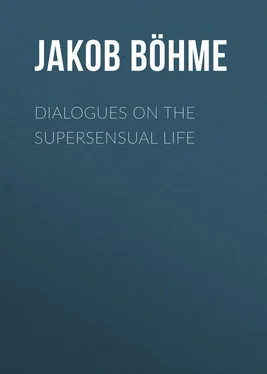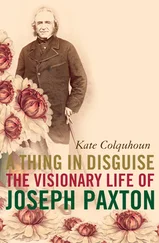Jakob Böhme - Dialogues on the Supersensual Life
Здесь есть возможность читать онлайн «Jakob Böhme - Dialogues on the Supersensual Life» — ознакомительный отрывок электронной книги совершенно бесплатно, а после прочтения отрывка купить полную версию. В некоторых случаях можно слушать аудио, скачать через торрент в формате fb2 и присутствует краткое содержание. ISBN: , Жанр: foreign_antique, foreign_prose, на английском языке. Описание произведения, (предисловие) а так же отзывы посетителей доступны на портале библиотеки ЛибКат.
- Название:Dialogues on the Supersensual Life
- Автор:
- Жанр:
- Год:неизвестен
- ISBN:http://www.gutenberg.org/ebooks/33742
- Рейтинг книги:4 / 5. Голосов: 1
-
Избранное:Добавить в избранное
- Отзывы:
-
Ваша оценка:
- 80
- 1
- 2
- 3
- 4
- 5
Dialogues on the Supersensual Life: краткое содержание, описание и аннотация
Предлагаем к чтению аннотацию, описание, краткое содержание или предисловие (зависит от того, что написал сам автор книги «Dialogues on the Supersensual Life»). Если вы не нашли необходимую информацию о книге — напишите в комментариях, мы постараемся отыскать её.
Dialogues on the Supersensual Life — читать онлайн ознакомительный отрывок
Ниже представлен текст книги, разбитый по страницам. Система сохранения места последней прочитанной страницы, позволяет с удобством читать онлайн бесплатно книгу «Dialogues on the Supersensual Life», без необходимости каждый раз заново искать на чём Вы остановились. Поставьте закладку, и сможете в любой момент перейти на страницу, на которой закончили чтение.
Интервал:
Закладка:
Behmen says, "The Essence of that Life eateth the Flesh of Christ and drinketh His Blood… Now if the Soul eat of this sweet, holy and heavenly food, then it kindleth itself with the great Love in the name and power of Jesus, whence its fire of anguish becometh a great triumph of joy and glory." 2 2 It should be noted that Jacob Behmen held strongly to the Sacrament of the Lord's Supper, the actual bread and wine as a "permissive medium" of the real feeding, in order that there may be "a visible sign of what is done in the inward ground." But he says "We should not depend on this means or medium alone , and think that Christ's Flesh and Blood is only and alone participated in this use of bread and wine, as Reason in this present time miserably erreth therein. No, that is not so. Faith, when it hungereth after God's love and grace, always eateth and drinketh of Christ's Flesh and Blood. Christ hath not bound himself to bread and wine alone , but hath bound himself to the faith , that he will be in men." Works, vol. iv. p. 208. Charles Gordon took the same view of the visible "eating," as being a great assistance to the spiritual feeding, but not indispensable to it. (Gordon's "Letters to his Sister.")
Behmen held that man lives at once in three worlds, firstly in the outward visible elementary world of space and time (where man " is the Time and in the Time;") secondly, the "Eternal Dark World, Hell, the centre of Eternal Nature, whence is generated the Soul-fire, that source of anguish, and thirdly, in the Eternal Light World, Heaven – the Divine habitation." The same processes of feeding and life take place in the three Worlds, so that physical feeding is a kind of outside sheath of spiritual feeding.
If the Soul accustoms itself to feed in this life upon the heavenly food (that panem de coelo omne delectamentum in se habentem ) it gradually itself becomes of quite heavenly substance, purged from darkness, and, when the natural life falls off at death, stands in heaven, where indeed it already is. But, if the Soul feeds upon the Spirit and Things of this World, then, when by reason of death, it can no longer feed upon them, it is left in the condition of mere "aching Desire," or eternal unsatisfied Hunger, working in a void, in perpetual anguish. Thus Heaven and Hell are not places, but conditions of the Soul. So Milton, who had no doubt studied the translation of Behmen made in his own time, writes:
"The mind is its own place, and in itself
Can make a Heaven of Hell, a Hell of Heaven."
They are in this life everywhere commingled, but when this life falls away, the Soul remains in that of the two states into which it has in this life brought itself. The Soul, after death, remains either as a satisfied Desire, that is, a Desire no longer but a Joy, or as an aching Desire. The Persian says: —
Heaven is the vision of fulfilled Desire
And Hell the shadow of a Soul on fire.
Behmen says, Heaven is fulfilled desire; Hell is a Soul on fire, no mere vision or shadow.
Heaven and Hell are within us, since our souls are portions of the universe of things, in every part of which Heaven and Hell are commingled. The gates of Heaven within us were shut in Adam, but the Power of God, Christ in Jesus, broke open by his passion "the closed gates of Paradise," that is, the gates of our "inward heavenly humanity," and now the wayfarer can, if he will, pass through. We do not spiritually live by a reasoning process, or acceptance of doctrines by the understanding, but by the action of the Desire in feeding upon the Spirit of Love, a process of laying hold, drawing in, and assimilating. True prayer is like feeding, or still more, perhaps, like the unconscious drawing in of the air: it should be as constant. By it is introduced the heavenly life from without to nourish the like heavenly life contained in the seed within. If a man thus rightly feeds, then, in him, the hellish life and passions, portions of the powers of darkness, "our creatures" as Behmen says, will be killed by starvation, wanting their appropriate food. On the other hand, a man can feed these also from without with their appropriate food by misdirected desire, thereby starving the heavenly life in the Soul.
Thus the essence of Behmen's teaching as to the Soul incarnate in Man and revealed by his body, is that it is an eternal Being, and that it is a source of joy or anguish according as it is, or is not, purified or tranquillised by communion with the Centre of Light, or the Fountain of Life. He does not contemplate, as some Eastern teachers perhaps do, the annihilation of the Will of the Soul by a kind of higher spiritual suicide; its existence is to him the very condition of good no less than of evil; he contemplates its liberation from the dark, contracted, self-prison, its purification, and entrance into the full heaven-life. This magical soul-fire, like visible fire, can rage and destroy, or it can serve as the means and ground of all good. Here is the foundation both of good and evil, in man as in all things.
To understand this better, one must consider the cosmic teaching lying behind the rich profusion of images, often inconsistent and clashing, in which Jacob Behmen embodies his Vision.
Man has fallen into Nature. But Nature itself, apart from and unfilled by the Divine Light, is a self-torment, a mere Want, a Desire, a Hunger. The true distinction between God and Nature is that God is an Universal All, while Nature is an Universal Want, viz: to be filled by God. Physical attraction is nothing but the outer sheath of this universal desire. Nature filled by God is Heaven or fulfilled Desire. 3 3 Dante's "ricchezza senza brama."
Without God it is Hell, mere Desire. Heaven is the Presence of God: Hell his Absence. It is as true to say that Heaven is in God, as to say that God is in Heaven.
Apart from the existence of God there could be neither Presence nor Absence, neither Heaven nor Hell. If the Soul of Man were wholly divided and separated from the Divine Life, it would, as a part of Nature, be a mere hungering, restless, conscious Desire. In so far as it is so separated it partakes of this pain. For "through all the Universe of Things nothing is uneasy, unsatisfied, or restless, but because it is not governed by Love, or because its Nature has not reached or attained the full birth of the Spirit of Love. For when that is done, every hunger is satisfied, and all complaining, murmuring, accusing, resenting, revenging and striving are as totally suppressed and overcome as coldness, thickness and horror of darkness are suppressed and overcome by the breaking forth of the light. If you ask why the Spirit of Love cannot be displeased, cannot be disappointed, cannot complain, accuse, resent or murmur, it is because the Spirit of Love desires nothing but itself, it is its own Good, for Love is God, and he that dwelleth in God dwelleth in Love." 4 4 Law's Works, vol. viii., p. 177.
Behmen's idea of the "fallen Angels" is that they are entirely and hopelessly divided from the Life of God. They are mere embodied, hopeless, self-tormenting Desires. They have fallen into the hell within themselves, they cannot but be hating, bitter, envious, proud, wrathful, restless; and therefore tormentors of others. They have lost that which man, however far astray, always possesses, the faculty of return or regeneration through submission to and union with God. The spark of the Life and Spirit of God which is in Men is not in the fallen Angels. Let us hope that Beings so utterly lost do not exist.
God is outside of Nature and yet in a sense inside also, because there is a divine life or virtue in Nature which, longing to re-unite itself with its source, is a cause of anguish while divided, and of joy when united. So, in the outer world, the seed buried in earth contains a power kindred to the virtue of the sun. It is this which breaks forth from the seed, forces itself up through the dark, imprisoning, and yet nourishing and necessary earth, and at last, if it can win its way through obstacles, cheerfully expands in the light of the sun and feeds upon his warmth. That, in man's inner nature, which answers to this power or life in the seed, is called by Behmen the Life or Spirit of Jesus Christ. Egoism or Ihood , the old contracting, narrowing cell, is destroyed as this expansive and expanding force grows and breaks forth. Behmen says: "As the Sun in the visible world ruleth over Evil and Good, and, with its light and power, and all whatsoever itself is, is present everywhere, and penetrates into every Being, and wholly giveth itself to every Being, and yet ever remaineth whole, and nothing of its being goeth away therewith. Thus also it is to be understood concerning Christ's person and office which ruleth in the inward spiritual world, and penetrateth into the faithful man's soul, spirit and heart. As the Sun worketh through a herb, so that the herb becometh filled with the virtue of the Sun, and, as it were, so converted by the Sun that it becometh wholly of the nature of the Sun, so Christ ruleth in the resigned will or Soul and Body, over all evil inclinations and generateth the man to be a new heavenly creature." The same teaching is finely set forth in a passage of William Law. 5 5 Works, vol. vii., p. 65, ed. 1765.
He says:
Интервал:
Закладка:
Похожие книги на «Dialogues on the Supersensual Life»
Представляем Вашему вниманию похожие книги на «Dialogues on the Supersensual Life» списком для выбора. Мы отобрали схожую по названию и смыслу литературу в надежде предоставить читателям больше вариантов отыскать новые, интересные, ещё непрочитанные произведения.
Обсуждение, отзывы о книге «Dialogues on the Supersensual Life» и просто собственные мнения читателей. Оставьте ваши комментарии, напишите, что Вы думаете о произведении, его смысле или главных героях. Укажите что конкретно понравилось, а что нет, и почему Вы так считаете.












